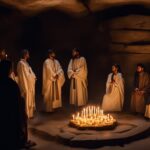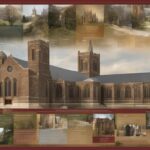The Church of the Brethren has a rich history that spans over three centuries. Its origins can be traced back to 1708 in Schwarzenau, Germany, where it was founded by Alexander Mack. Influenced by Pietism and Anabaptism, Mack and a group of like-minded individuals came together to form a new community of believers.
The early Brethren, as they called themselves, shared many beliefs with other Protestant groups but also had distinct differences. They were committed to peaceful living and emphasized the importance of a shared search for truth. In August 1708, the first baptisms took place, symbolizing the birth of the Church of the Brethren.
In the early 18th century, many Brethren emigrated to North America, seeking religious freedom and establishing the first American congregation in Germantown, Pennsylvania, in 1723. This marked the beginning of the Church of the Brethren’s expansion across the continent.
Throughout its history, the Church of the Brethren has experienced schisms and divisions, but it remains a vibrant and diverse religious community today. With approximately 100,000 members in the United States and Puerto Rico, as well as members in other countries, the Church of the Brethren continues to uphold its core beliefs and values.
Key Takeaways:
- The Church of the Brethren traces its origins back to 1708 in Schwarzenau, Germany.
- Founded by Alexander Mack, the Brethren emphasized peaceful living and a shared search for truth.
- The Church of the Brethren expanded to North America in the early 18th century, establishing its first American congregation in Germantown, Pennsylvania.
- The Brethren have approximately 100,000 members in the United States and Puerto Rico, with additional members in other countries.
- The Church of the Brethren has experienced schisms throughout its history, but remains a strong and diverse religious community.
Beliefs and Doctrines
The Church of the Brethren is grounded in its beliefs and doctrines, which guide its members in their faith and daily lives. Emphasizing the teachings and example of Jesus Christ, the Brethren look to the New Testament as their sole creed. At the core of their beliefs is the principle of nonresistance, also known as Christian pacifism, which distinguishes them as one of the three historic peace churches.
Central to their doctrines are the practices of believer’s baptism, plain living, discipleship, and obedience to Jesus. Believer’s baptism signifies an individual’s commitment to the Christian faith and the community of believers. Plain living embodies a devotion to simplicity in all aspects of life, allowing for a focus on spiritual growth and service to others. Discipleship involves following in the footsteps of Jesus, emulating His teachings and example of love, compassion, and humility. Obedience to Jesus means aligning one’s actions and choices with His teachings and commandments.
In worship, the Church of the Brethren rejects the use of musical instruments, preferring acapella singing. This choice reflects their commitment to simplicity and avoids distractions during worship, allowing the congregation to fully engage in spiritual expression.
The Teachings of Jesus
“Do not resist an evil person. If someone strikes you on the right cheek, turn to him the other also.” – Matthew 5:39
Jesus teaches nonresistance and peaceful resolution of conflicts, a core principle embraced by the Church of the Brethren.
The Brethren believe that adherence to these doctrines helps them cultivate a deep faith and live out the values of peace, love, and service in their communities.
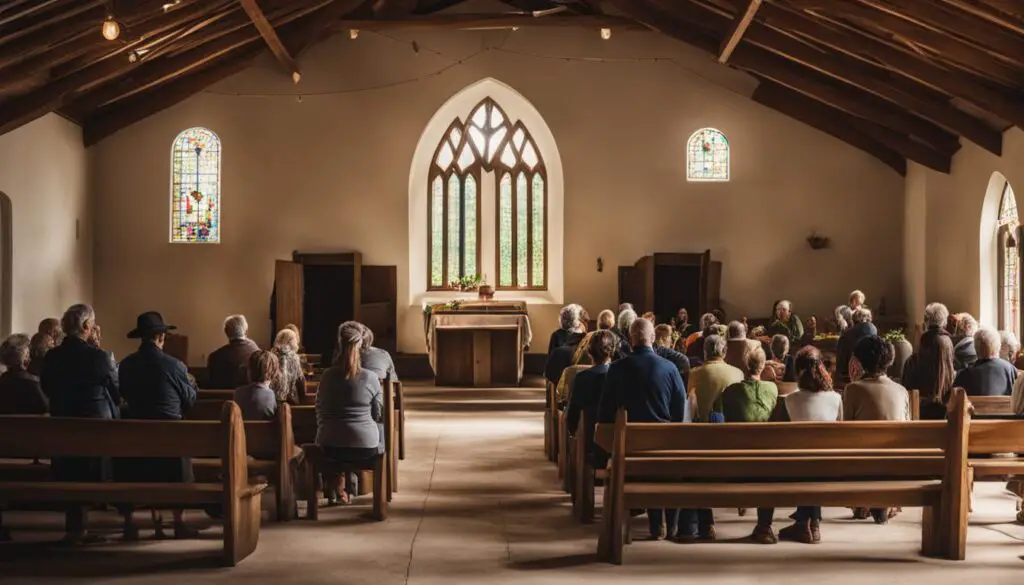
Sacraments and Rituals
The Church of the Brethren places great importance on sacraments and rituals as integral aspects of their worship and spiritual journey. These practices not only symbolize their commitment to the Christian faith but also foster a sense of community and connection among members.
Believer’s Baptism
The Brethren practice believer’s baptism by trine immersion, which involves being immersed in water three times. This baptism symbolizes a personal commitment to follow Jesus Christ and become a member of the Christian community. It is seen as a transformative experience that signifies spiritual rebirth and renewal.
The Love Feast
An important ritual observed by the Brethren is the Love Feast. It is a unique combination of foot washing, a fellowship meal, and communion. The Love Feast provides an opportunity for members to serve one another symbolically and experience the humility and servanthood exemplified by Jesus Christ during the Last Supper.
“The Love Feast is a powerful reminder of our unity, love, and mutual responsibility within the Church of the Brethren.”
Anointing for Healing
In addition to baptism and the Love Feast, anointing for healing is another significant ritual practiced by the Church of the Brethren. This practice involves anointing individuals with oil and praying for their physical, emotional, or spiritual healing. It reflects the belief in the power of prayer and communal support in times of illness or distress.
These sacraments and rituals hold deep spiritual meaning for the Church of the Brethren, reinforcing their commitment to living a life of faith, community, and service.
Leadership and Clergy
In the Church of the Brethren, leadership is a shared responsibility. While they believe in the priesthood of all believers, there is also an ordained ministry consisting of both men and women who play vital roles in the community. These ministers are dedicated to preaching the Word of God, administering church affairs, and providing pastoral care to the congregation.
The Church of the Brethren follows a congregationalist structure, allowing each congregation to have autonomy in decision-making. However, they also come together as districts, pooling their wisdom and insights during the Annual Conference to make collective decisions and set policies for the entire denomination.
Ordained Ministry
The ordination process in the Church of the Brethren is a rigorous journey undertaken by individuals who have been called by God to serve as ministers. Men and women are equally eligible for ordination, reflecting the denomination’s commitment to gender equality in leadership positions.
Those called to ministry undergo theological education and training at recognized seminaries or universities. This comprehensive preparation equips them with biblical knowledge, pastoral skills, and the ability to engage meaningfully with their congregations.
Commitment to Service
In addition to their pastoral duties, ministers within the Church of the Brethren are encouraged to engage in acts of service and outreach. They embrace a servant leadership model, following the example of Jesus Christ, who ministered to the needs of others. This commitment to service extends beyond the confines of the church walls and into the wider community.
Ministers often collaborate with congregational members to organize and participate in initiatives that address various social and humanitarian issues. From local community projects to international mission partnerships, the Church of the Brethren actively seeks to make a positive difference in the world.
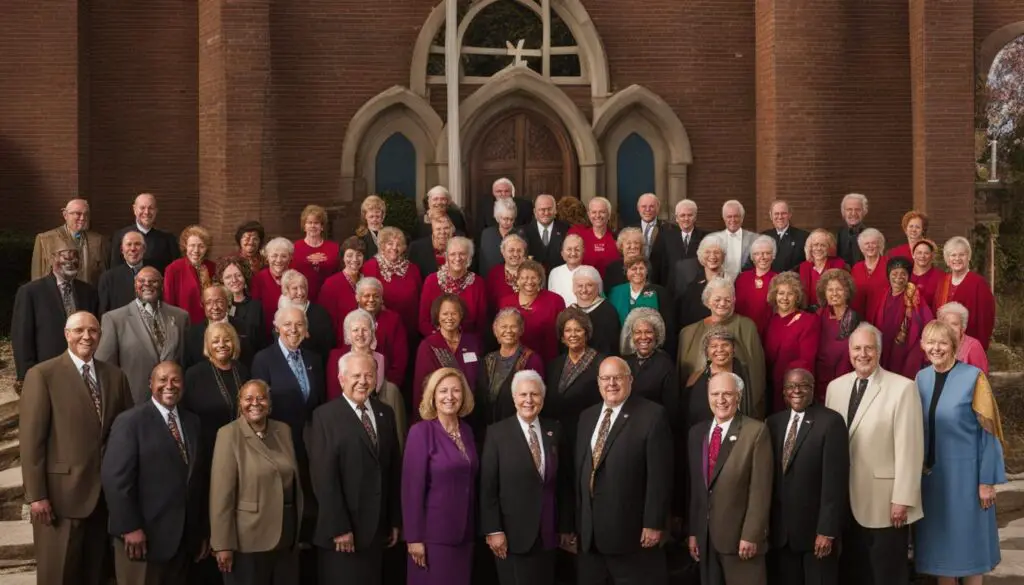
Leadership within the Church of the Brethren is characterized by humility, compassion, and a deep desire to serve God and others. Through their guidance and care, ministers empower their congregations to live out the values of faith, peace, and love.
Worship Practices
The worship practices of the Church of the Brethren are rooted in simplicity and devotion to God. During services, members engage in various activities that foster spiritual growth and community connection.
Simplicity in Worship
Central to worship in the Church of the Brethren is a focus on simplicity. This simplicity is reflected in the absence of musical instruments. Instead, the congregation relies on the power of acapella singing to elevate their worship experience. With heartfelt voices harmonizing, they create a unique atmosphere of unity and reverence.
Components of Worship
Church services often begin with prayers, where members offer their intentions and seek guidance. The worship leader then leads the congregation in a reading from Scripture, emphasizing the teachings of Jesus Christ. Hymns are sung, embracing both traditional classics and new compositions, as a form of worship and devotion.
The power of music carries their voices to new heights, creating a sacred connection with the divine.
A significant part of Brethren worship is the passion for preaching. Faithful ministers deliver sermons that draw upon the teachings of Jesus, offering guidance and inspiration to the congregation. These sermons often explore topics such as discipleship, peace, and compassionate living.
The Love Feast
The Love Feast is a cherished and integral part of the worship practices of the Church of the Brethren. It consists of three components: foot washing, fellowship meal, and communion.
The foot washing ceremony is a humbling experience, symbolizing the servanthood and love exemplified by Jesus during the Last Supper. Brothers and sisters in faith wash each other’s feet, embracing humility and deepening their sense of community.
The fellowship meal follows foot washing, where the congregation shares a simple meal together. This meal not only nourishes the body but also nourishes the sense of fellowship and togetherness among the members.
Finally, the Love Feast culminates in communion, where the congregation partakes in the symbolic act of sharing bread and wine, representing the body and blood of Christ. Communion serves as a profound reminder of Jesus’ ultimate sacrifice and unifying presence within the church.
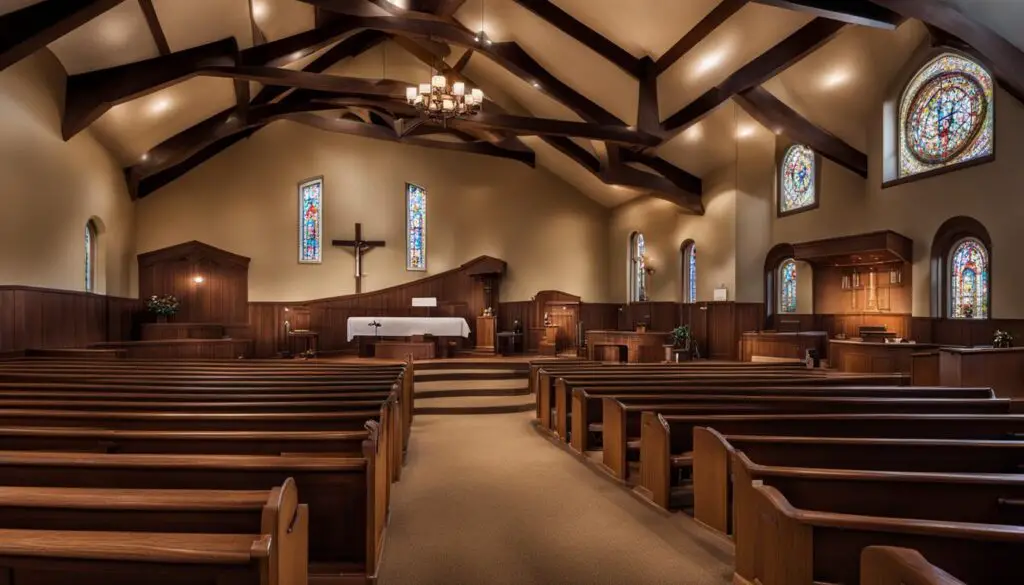
Worship in the Church of the Brethren is a transformative experience, characterized by simplicity, devotion, and a deep sense of community. Through prayer, Scripture reading, hymn singing, preaching, and the Love Feast, members cultivate their relationship with God and with one another.
| Worship Practices | Description |
|---|---|
| Simplicity in Worship | Emphasis on acapella singing and absence of musical instruments |
| Components of Worship | Prayers, Scripture reading, hymn singing, and preaching |
| The Love Feast | Foot washing, fellowship meal, and communion |
Sacred Texts
In the Church of the Brethren, the Bible holds a central place as the sacred text. Guided by the teachings of Jesus Christ, the Brethren value the New Testament as the foundation of their faith and practice. While they do not have a specific denominational translation, they rely on various Bible translations that align with their beliefs.
Emphasizing the teachings of Jesus, the Brethren find inspiration, guidance, and wisdom within the pages of the Bible. They seek to apply its teachings to their daily lives, striving to live in accordance with its principles of love, compassion, and justice.
From stories of faith and redemption to passages that illuminate ethical and moral ideals, the sacred texts of the Church of the Brethren serve as a compass, guiding members in their spiritual journey and shaping their understanding of the world.
“The Bible is a lamp unto my feet and a light unto my path.” – Psalm 119:105
Bible Translations Used by the Church of the Brethren
| Translation | Description |
|---|---|
| New International Version (NIV) | A widely popular modern English translation known for its clarity and accessibility. |
| New Revised Standard Version (NRSV) | An ecumenical translation widely used by mainline Protestant denominations. |
| English Standard Version (ESV) | A formal translation that aims to balance accuracy with readability. |
| King James Version (KJV) | A classic translation cherished for its literary beauty and historical significance. |
| The Message | A contemporary paraphrase that seeks to present the Bible in modern, everyday language. |

The sacred texts of the Church of the Brethren serve as a source of inspiration, guidance, and spiritual nourishment. Through the study and interpretation of the Bible, the Brethren seek to deepen their relationship with God and live out their faith in meaningful ways.
Denominations and Sects
The Church of the Brethren has a rich history marked by various schisms and divisions that have shaped its denominational landscape. One notable split occurred in the 1880s, resulting in a three-way division. These divisions led to the formation of distinct branches within the Brethren community.
Church of the Brethren
The largest branch that emerged from the schism is known today as the Church of the Brethren. Originally named the German Baptist Brethren, the denomination changed its name in 1908 to reflect its identity and mission. The Church of the Brethren embodies the core values and beliefs of the Brethren tradition.
Old German Baptist Brethren
The Old German Baptist Brethren is another branch that emerged from the 1880s schism. This group emphasizes traditional practices and conservative beliefs within the Brethren movement. The Old German Baptist Brethren maintain a distinctive dress style and adherence to plain living.
Brethren Church
The Brethren Church is the third branch that arose from the division in the 1880s. This branch holds a more progressive stance while maintaining a commitment to Brethren heritage. The Brethren Church actively engages with contemporary issues and seeks to connect with a broader range of individuals.
While these divisions exist within the Church of the Brethren, all branches share a common heritage and uphold the core values of the Brethren tradition. Despite their differences, these denominations and sects continue to work towards a common goal of spreading the teachings of Jesus Christ and promoting peace, simplicity, and community.

Community and Outreach
The Church of the Brethren places a strong emphasis on community and outreach, embodying the principles of love and care for one another. With their commitment to living in community and fostering relationships, the Brethren actively engage in various service and mission initiatives that extend beyond their local congregations. They strive to bring about positive change and make a meaningful impact in the world.
Local Community
The Brethren actively participate in community-building activities, organizing events, and contributing to local initiatives that address the needs of the community. They promote a culture of kindness, generosity, and compassion, striving to create a loving and supportive environment for all.
Global Mission Partnerships
The Church of the Brethren is committed to establishing mission partnerships in various countries, working alongside local communities to uplift, empower, and provide support. These partnerships extend to countries such as India, China, Nigeria, Ecuador, and many more, where the Brethren engage in projects that focus on education, healthcare, sustainable development, and poverty alleviation.
Disaster Relief and Volunteer Service
In times of crisis, the Church of the Brethren is at the forefront of disaster relief efforts. They collaborate with organizations and volunteers to provide immediate assistance to affected areas, offering shelter, food, and support to those in need. The Brethren also actively participate in volunteer service projects both within the United States and on an international scale, helping communities rebuild and thrive.
“We believe in the transformative power of community and service. Through our outreach efforts, we strive to create a better world for all, guided by the teachings of Jesus Christ.” – Church of the Brethren
| Community and Outreach Initiatives | Impact |
|---|---|
| Local community-building activities | Strengthening relationships and fostering a sense of belonging |
| Mission partnerships in various countries | Providing education, healthcare, and support for disadvantaged communities |
| Disaster relief efforts | Offering immediate assistance and support during times of crisis |
| Volunteer service projects | Helping communities rebuild and thrive through hands-on involvement |
Architectural and Artistic Features
The Church of the Brethren values simplicity and functionality in its architectural and artistic expressions. While there is no specific architectural style associated with the Brethren, each congregation has the flexibility to design its own unique worship space.
Although the emphasis is on practicality, the Brethren still appreciate the beauty of artistic expressions within their worship. Hymn singing is an integral part of their worship, allowing congregants to engage in a meaningful musical experience. Visual arts also play a role, as congregations may incorporate paintings, sculptures, and other forms of art into their worship spaces.
The Church of the Brethren, however, tends to avoid elaborate decorations or religious symbols in their worship spaces. Instead, they uphold the belief that simplicity allows for a focus on personal spirituality and a deeper connection to their faith.
Contemporary Issues and Challenges
As with any religious organization, the Church of the Brethren is not immune to the challenges of the modern world. One of the key challenges facing the Brethren is engaging younger generations. In a time of shifting priorities and evolving belief systems, it is vital for the church to connect with younger individuals and provide them with a sense of belonging.
Adapting to societal changes is another significant challenge for the Brethren. With rapid advancements in technology, the church must find innovative ways to reach out and connect with people in an increasingly digital world. Embracing social media platforms, online worship services, and virtual communities are essential steps in addressing this challenge and remaining relevant.
Furthermore, the Church of the Brethren is committed to addressing important issues such as social justice, racial equality, and LGBTQ+ inclusion. These are complex matters that require open dialogue, education, and a reevaluation of traditional beliefs. The church is dedicated to fostering a more inclusive and equitable society by advocating for justice, fairness, and compassion.
In an era of growing secularism, the Brethren face the challenge of remaining relevant while upholding their core beliefs and values. As society becomes more diverse in its religious and spiritual landscape, the church must adapt its practices and outreach efforts to engage with a wider audience. Striking a balance between preserving tradition and embracing change is crucial for the Brethren to thrive in a rapidly evolving world.
FAQ
What is the history of the Church of the Brethren?
The Church of the Brethren traces its origins back over 300 years to 1708 in Schwarzenau, Germany. It was founded by Alexander Mack, a miller who was influenced by Pietism and Anabaptism. The group called themselves the “brethren” and began emigrating to North America in the early 18th century, establishing the first American congregation in Germantown, Pennsylvania, in 1723.
What are the beliefs and doctrines of the Church of the Brethren?
The Brethren emphasize following the teachings and example of Jesus Christ in daily life. They believe in nonresistance or Christian pacifism and hold the New Testament as their only creed. Central doctrines include believer’s baptism, plain living, discipleship, and obedience to Jesus. The Brethren reject the use of musical instruments in worship and emphasize simplicity in all aspects of life.
What sacraments and rituals does the Church of the Brethren practice?
The Church of the Brethren practices believer’s baptism by trine immersion, which involves being immersed in water three times. They also observe the love feast, including foot washing, a fellowship meal, and communion. Anointing for healing is another ritual practiced by the Brethren.
What is the leadership structure of the Church of the Brethren?
The Church of the Brethren believes in the priesthood of all believers but also has an ordained ministry consisting of both men and women. These ministers are responsible for preaching, administering church affairs, and providing pastoral care to the congregation. The Brethren have a congregationalist structure with districts that come together for an Annual Conference to make decisions and set policies.
What are the worship practices of the Church of the Brethren?
Worship in the Church of the Brethren is characterized by simplicity, including prayer, reading from Scripture, singing hymns, and preaching. They do not use musical instruments in worship, preferring acapella singing. The love feast, with its components of foot washing, fellowship meal, and communion, is an important part of their worship practices.
What are the sacred texts of the Church of the Brethren?
The Church of the Brethren holds the Bible as its sacred text, specifically relying on the New Testament as their guide and emphasizing the teachings of Jesus Christ. They use various Bible translations that align with their beliefs.
Are there different denominations or sects within the Church of the Brethren?
Yes, the Church of the Brethren has experienced several schisms throughout its history. One major split occurred in the 1880s, resulting in a three-way division. The largest branch is the Church of the Brethren, formerly known as the German Baptist Brethren. The Old German Baptist Brethren and the Brethren Church are the other two branches that emerged from the schism.
How does the Church of the Brethren engage with the community and conduct outreach?
Community and outreach are important aspects of the Church of the Brethren’s beliefs. They prioritize living in community and caring for one another. The Brethren are actively involved in various service and mission initiatives, including mission partnerships in different countries and participating in projects such as disaster relief and volunteer service.
What are the architectural and artistic features of the Church of the Brethren?
The Church of the Brethren does not have a specific architectural style as each congregation may have its own building design. However, simplicity and functionality are common characteristics. The Brethren value artistic expressions, such as hymn singing and visual arts, as part of their worship but do not use elaborate decorations or religious symbols in their worship spaces.
What are some contemporary issues and challenges facing the Church of the Brethren?
Like many religious organizations, the Church of the Brethren faces challenges such as engaging younger generations, adapting to societal changes, and addressing issues such as social justice, racial equality, and LGBTQ+ inclusion. They also strive to remain relevant in an increasingly secular world while staying true to their core beliefs and values.





